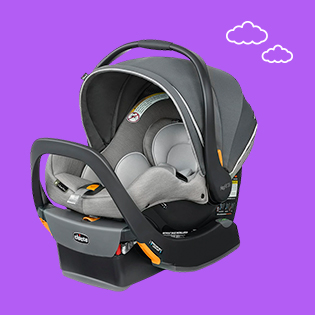You can usually count on an over-the-counter pain reliever like ibuprofen to deliver some relief when you have a crushing headache or migraine, are uncomfortable from a cold or the flu, or are just dealing with an ache or pain. But is it still safe to take when you're pregnant or breastfeeding?
Ibuprofen is a non-steroidal anti-inflammatory drug (NSAID) that's also known by the name brands Motrin and Advil. Here's what to know about taking the med when you're expecting or nursing — plus alternative options that can help you feel better.
Most women should avoid ibuprofen during pregnancy. The medication can increase the risk of certain birth defects, so you shouldn't take it unless directed by your doctor.
Acetaminophen is a safe alternative. Acetaminophen, aka Tylenol, is the preferred option when you need an OTC pain reliever during pregnancy.
Ibuprofen is safe to take when you're breastfeeding. Minimal amounts pass into breast milk and aren’t known to harm the baby. Just take the smallest effective dose for the least amount of time.
Can I take ibuprofen while pregnant?
NSAIDs like ibuprofen generally shouldn't be used during pregnancy. (Other NSAIDs include sodium naproxen, aka Aleve, and aspirin.)[1]
That's especially true during after week 20 of pregnancy, particularly during the third trimester, since NSAIDs can raise the risk of certain birth defects and other issues, according to the American College of Obstetricians and Gynecologists (ACOG).[2] Those may include premature closure of the ductus arteriosus (a vital fetal blood vessel to the heart), kidney problems in the fetus, and low amniotic fluid levels.
There may be some exceptions when the benefits of taking ibuprofen during pregnancy outweigh the potential risks. In those cases, you should make an informed decision by talking with your health care practitioner Together you can discuss the pros and cons, and, if you decide to take ibuprofen, talk about the right dose for you.
Can I take ibuprofen while breastfeeding?
Most NSAIDs, including ibuprofen, get the green light when you're breastfeeding. (The exception is aspirin, which nursing moms should avoid, as it may increase the risk of Reye’s syndrome in infants.)
Read This Next
While minimal amounts do get into breast milk, it's not known to cause side effects in babies and is considered safe for nursing moms to take, according to the American Academy of Pediatrics (AAP).[3]
In fact, ibuprofen is usually the pain med that's recommended to new moms when they're recovering postpartum, especially if they're recovering from a C-section, notes What to Expect Medical Review Board Member Suzanne Chan, D.N.P., C.L.C., C.P.S.T., a pediatric nurse practitioner and lactation consultant at the Infant Cardiac NICU at NewYork-Presbyterian Morgan Stanley Children's Hospital in New York City.
As with any medication taken when you're breastfeeding, talk with your health care provider to confirm that ibuprofen is right for you and decide on the right dosage. In general, you'll want to take the smallest dose for the least amount of time that still gives you relief, Chan says.
Pregnancy-safe alternatives to ibuprofen
Even though ibuprofen is usually off the table when you're pregnant, you can still get relief from a headache or minor aches and pains from a cold, the flu, or injuries.
Medication-wise, acetaminophen, known by the brand name Tylenol, is safe for most women during pregnancy. As with all drugs, it's best to take the lowest effective dose for the shortest amount of time.
You should check with your provider first before taking acetaminophen or another OTC medication when you're pregnant.
If you're thinking about taking acetaminophen for a headache, keep in mind that some acetaminophen-based headache meds (like Excedrin) also contain caffeine. Those are okay when you're pregnant too, as long as your total caffeine intake for the day (including the acetaminophen and any coffee or other caffeine sources you have) doesn't exceed 200 milligrams.
Not sure what’s safe to take for pain relief during pregnancy or breastfeeding? The What to Expect app offers expert-backed guidance, daily health tips, and answers to your medication questions — right when you need them most.
Prefer to steer clear of meds altogether? Natural remedies can help you feel better too.
For a headache: Lying in a dark, quiet room with a cool compress on your head can help curb the throbbing. Some people find that massaging their heads or even doing some gentle stretching can also make a difference. "Hydration, ice pack to the forehead, or a hot shower all provide some relief," shares What to Expect Community mom hllf2224.
For a cold or the flu: Hot tea with honey and salt water gargles (1/4 teaspoon salt mixed with 8 ounces of water) can help soothe a scratchy throat, while saline nose drops and nasal strips (like Breathe Right) can clear things up when you're congested. And of course, try to rest as much as possible so your body can put its energy towards fighting off those germs.
For muscle aches and pains: Try to stay off the affected area as much as you can. Use ice to take down swelling for new injuries, or try a heat wrap or a warm bath for stiff or tense muscles. Just don't let the water get too hot — 97 or 98 degrees Fahrenheit is just right.
Ibuprofen is typically off-limits when you're pregnant, especially later in the second trimester and the third trimester. However, it's usually okay when you're breastfeeding, as long as you take the smallest dose for the shortest amount of time.
If you have questions or concerns about taking that or any other OTC med, check with your practitioner or your baby's pediatrician.




























































































